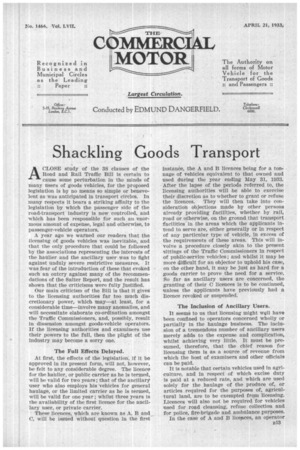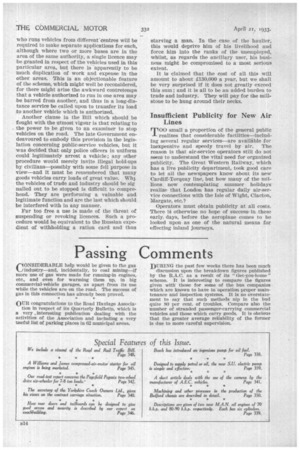Shackling Goods Transport
Page 27

Page 28

If you've noticed an error in this article please click here to report it so we can fix it.
A CLOSE study of the 38 clauses of the Road and Rail Traffic Bill is certain to cause some perturbation in the minds of many users of goods vehicles, for the proposed legislation is by no means so simple or benevolent as was anticipated in transport circles. In many respects it bears a striking affinity to the legislation by which the passenger side of the road-transport industry is now controlled, and which has been responsible for such an -enormous amount of expense, legal and otherwise, to passenger-vehicle operators.
A year ago we warned our readers that the licensing of goods vehicles was inevitable, and that the only procedure that could be followed by the associations representing the interests of the haulier and the ancillary user -was to fight against unduly severe restrictive measures. It was fear of the introduction of these that evoked such an outcry against many of the recommendations of the Salter Report, and the result has shown that the criticisms were fully justified.
Our main criticism of the Bill is that it gives to the licensing authorities far too much discretionary power, which may—at least, for a considerable time—involve many anomalies, and will necessitate elaborate co-ordination amongst the Traffic Commissioners, and, possibly, result in dissension amongst goods-vehicle operators. If the licensing authorities and examiners use their powers to the full, then the plight of the industry may become a sorry one.
The Full Effects Delayed.
• At first, the effects of the legislation', if it be approved in its present form, will not, however, be felt to any considerable degree. The licence for the haulier, or public carrier as he is termed, will be valid for two years ; that of the ancillary user who also employs his vehicles for general haulage, or the limited carrier as he is termed, will be valid for one year ; whilst three years is the availability of the first licence for the ancillary user, or private carrier.
These licences, which are known as A, B and C, will be issued without question in the first instance, the A and B licences being for a tonnage of vehicles equivalent to that owned and used during the year ending May 31, 1933. 'After the lapse of the periods referred to, the licensing authorities will be able to exercise their discretion as to whether to grant or refuse the licences. They will then take into consideration objections made by other persons already providing facilities, whether by rail, road or otherwise, on the ground that transport facilities in the areas which the applicants intend to serve are, either generally or in respect of any particular type of vehicle, in excess of the requirements of these areas. This will involve a procedure closely akin to the present sittings of the Traffic Commissioners in respect of public-service vehicles ; and whilst it may be more difficult for an objector to uphold his case, on the other hand, it may be just as hard for a goods carrier to prove the need for a service. So far as ancillary users are concerned, the granting of their C licences is to be continued, !unless the applicants have previously had a licence revoked or suspended.
The Inclusion of Ancillary Users.
It seems to us that licensing might well have been confined to operators concerned wholly or partially in the haulage business. The inclusion of a tremendous number of ancillary users merely adds to the expense and complication, whilst achieving very little. It must be presumed, therefore, that the chief reason for licensing them is as a source of revenue from which the host of examiners and other officials can be paid.
It is notable that certain vehicles used in agriculture, and in respect of which excise duty is paid at a reduced rate, and which are used solely for the haulage of the produce of, or articles required for the purposes of, agricultural land, are to be exempted from licensing. Licences will also not be required for vehicles used for road cleansing, refuse collection and for police, fire-brigade and ambulance purposes.
In the case of A and B licerices, an operator who rums vehicles from different'eentres will be required to make separate applications for each, although where two or more "bases are in the area of the same authority, a single licence may be granted in respect of the vehicles used in this particular area, but there is apparently to be Much duplication of work and expense in the other areas. This is an objectionable feature of the scheme, which might well be reconsidered, for there might arise the awkward contretemps that a vehicle authorized to run in one area may be barred from another, and thus in a long-distance service be called upon to transfer its load to another vehicle which is authorized.
Another clause in the Bill which should be fought with the utmost vigour is that relating to the power to be given to an examiner to stop vehicles on the road. The late Government endeavoured to embody this provision in the legislation concerning public-service vehicles, but it was decided that only police officers in uniform could legitimately arrest a vehicle ; any other procedure would merely invite illegal hold-ups by civilians—possibly with some fell purpose in view—and it must be remembered that many goods vehicles carry loads of great value. W115 the vehicles of trade and industry should be sig nailed out to be stopped is difficult to comprehend. They are performing a valuable and legitimate function and are the last which should be interfered with in any manner.
Far too free a use is made of the threat of suspending or revoking licences. Such a procedure would be equivalent to the Russian expedient of withholding a ration card and thus starving a man. In the case of the haulier, this would deprive him of his livelihood and force him into the ranks of the unemployed, whilst, as regards the ancillary user, his business might be compromised to amost serious extent.
It is claimed that the cost of all this will amount to about £130,000 a year, but we shall be very surprised if it does not greatly exceed this sum ; and it is all to be an added burden to trade and industry. They will pay for the millstone to be hung around their necks.
Insufficient Publicity for New Air Lines
T00 small a proportion of the general public realizes that considerable facilities—including several regular services—are available for inexpensive and speedy travel by air. The reason is that air-service operators still do not seem to understand the vital need for organized publicity. The Great Western Railway, which has a live publicity department, took good care to let all the newspapers know about its new Cardiff-Torquay line, but how many of the millions now contemplating summer holidays realize that London has regular daily air-service connections with the Isle of Wight, Clacton, Margate, etc.?
Operators must obtain publicity at all costs. There • IS otherwise no hope of success, in these early. days, before the aeroplane comes to be looked upon as one of the natural means for effecting inland journeys.




























































































